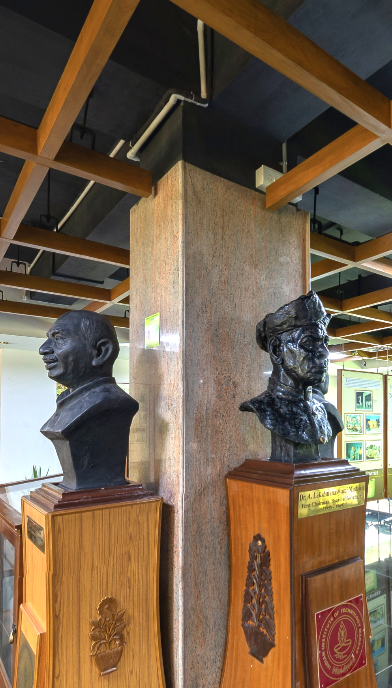-
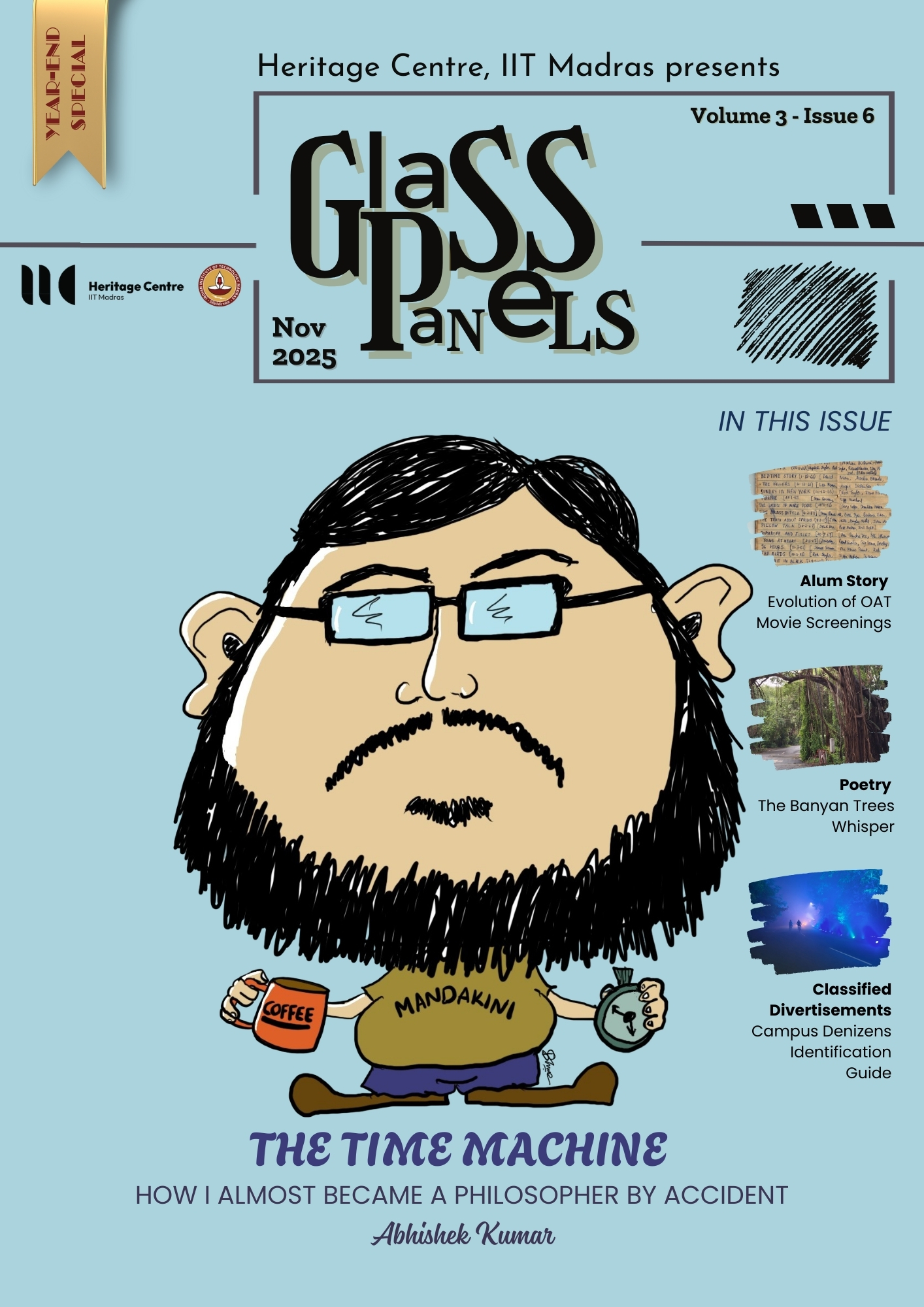
Glass Panels November 2025 - The Time Machine
Glass Panels – November 2025 (Year-End Special)
The November 2025 year-end special issue of Glass Panels brings together nostalgia, creativity, heritage, and campus life in a rich concluding edition for the year. Highlights include Ramanathan Srikantaiah’s evocative memoir From 16 mm to 35 mm, tracing the evolution of Open Air Theatre movie screenings; Abhishek Kumar’s witty and imaginative sci-fi tale The Time Machine, set inside IITM’s iconic hostels; and Jyoti Sahu’s lyrical poem The Banyan Trees Whisper, celebrating the campus’s majestic natural heritage. The issue also features Classified Divertisements and snapshots of distinguished visitors who graced the Centre in recent months. A reflection on transitions within the Heritage Centre—including welcoming Prof. Arun Menon as the new Faculty-in-Charge—rounds out an edition that blends memory, culture, humour, and institutional legacy.
Meta Description
Glass Panels Nov 2025: Year-end special with OAT movie history, sci-fi campus story, poetic campus reflections, visitor highlights & Heritage Centre updates.
Keywords/Tags
IIT Madras, Heritage Centre, Glass Panels magazine, November 2025 issue, Year-end special, Open Air Theatre history, OAT movie screenings, Ramanathan Srikantaiah, IITM campus stories, Abhishek Kumar Time Machine, Jyoti Sahu poetry, Banyan Avenue poem, Campus Denizens guide, Classified Divertisements, Distinguished visitors IITM, Heritage Centre events, Prof. Arun Menon, IITM history, Institutional heritage, Campus culture, Museum stories, Heritage Centre newsletter, Alumni memories, IIT Madras archives
Dec 11, 2025
-
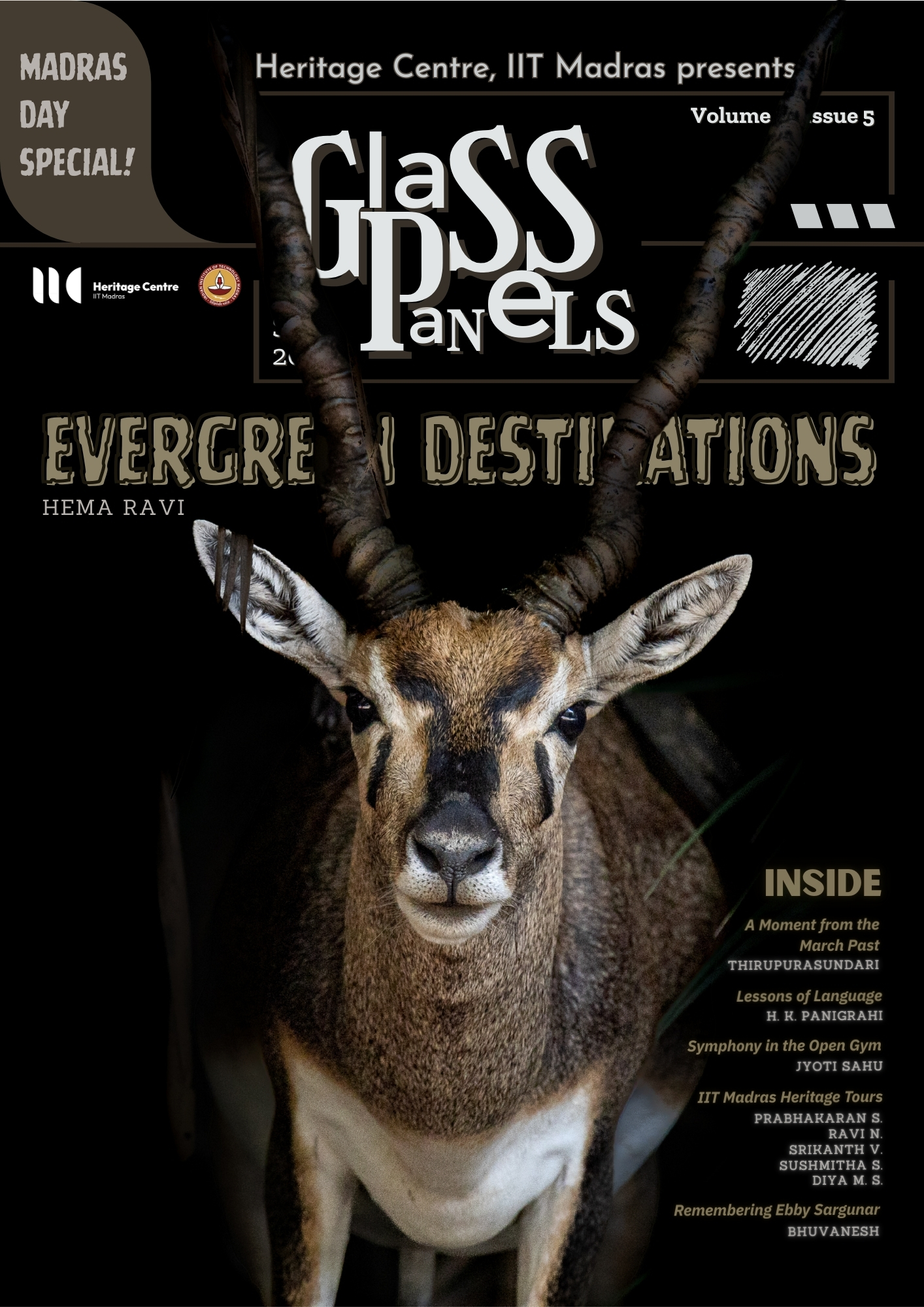
Glass Panels September 2025 - Evergreen Destinations
Glass Panels – September 2025 (Madras Day Special)
This Madras Day special issue of the Heritage Centre magazine celebrates the city and its deep ties with IIT Madras. Highlights include a tribute to alumnus and musician Ebby Sargunar, nostalgic reflections on campus landmarks in Evergreen Destinations, vivid photo essays from the Madras Week Heritage Tours, and A Moment from the March Past recalling IITM’s proud role in the 1970 Inter‑IIT Sports Meet. Also featured are H. K. Panigrahi’s Lessons of Language, Jyoti Sahu’s Symphony in the Open Gym, creative writing, divertisements, and visitor highlights — blending heritage, memory, and community spirit.Meta Description
Glass Panels Sep 2025: Madras Day special with tributes, heritage tours, campus nostalgia & community voices.
Keywords/Tags
IIT Madras, Heritage Centre, Glass Panels magazine, September 2025 issue, Madras Day, Madras Week, Heritage tours IITM, Ebby Sargunar tribute, Beat‑X jazz band, ACID folk rock band, IITM music history, Evergreen Destinations, Gajendra Circle, Open Air Theatre, Inter‑IIT Sports Meet 1970, March Past photograph, Lessons of Language, Mr. IIT, Campus heritage, Institutional history, Alumni stories, Museum musings, Heritage Square quiz, Distinguished visitors, Campus culture IITM
Sep 15, 2025
-
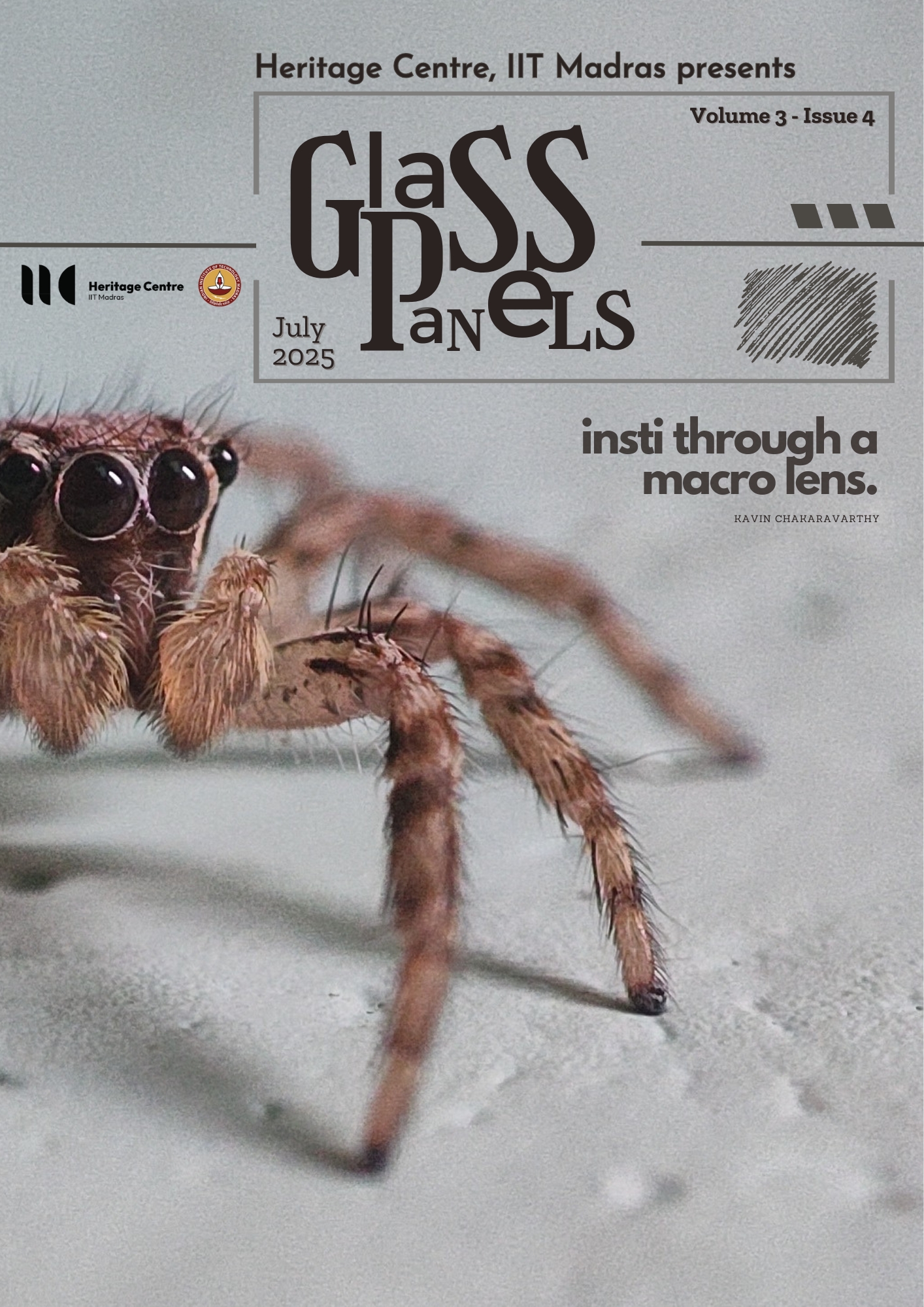
Glass Panels July 2025 - Insti Through a Macro Lens
Glass Panels – July 2025
This issue of the Heritage Centre magazine showcases IIT Madras through fresh perspectives. Highlights include Insti Through a Macro Lens by V. Kavin Chakaravarthy, capturing the hidden natural world of insects and spiders on campus; alumnus K. Sashi Rao’s account of IITM hockey’s rise to glory; Bhuvanesh Santharam’s nostalgic piece on revisiting alumni memories with Hugga; and Dr. Srinivas Jallepalli’s essay on education and values. It also features poetry, divertisements, visitor highlights, campus photography, and news bites — blending heritage, nature, and community voices.Meta Description
Glass Panels Jul 2025: macro lens nature essay, IITM hockey history, alumni memories & campus heritage.
Keywords/Tags
IIT Madras, Heritage Centre, Glass Panels magazine, July 2025 issue, Macro lens photography, Jumping spiders IITM, Campus insects, V. Kavin Chakaravarthy, IITM hockey history, Seven years to glory, Alumni memories, Hugga, Education values, Dr. Srinivas Jallepalli, Campus heritage, Institutional history, Alumni stories, Museum musings, Heritage Square quiz, Distinguished visitors, Campus culture IITM
Jul 15, 2025
-
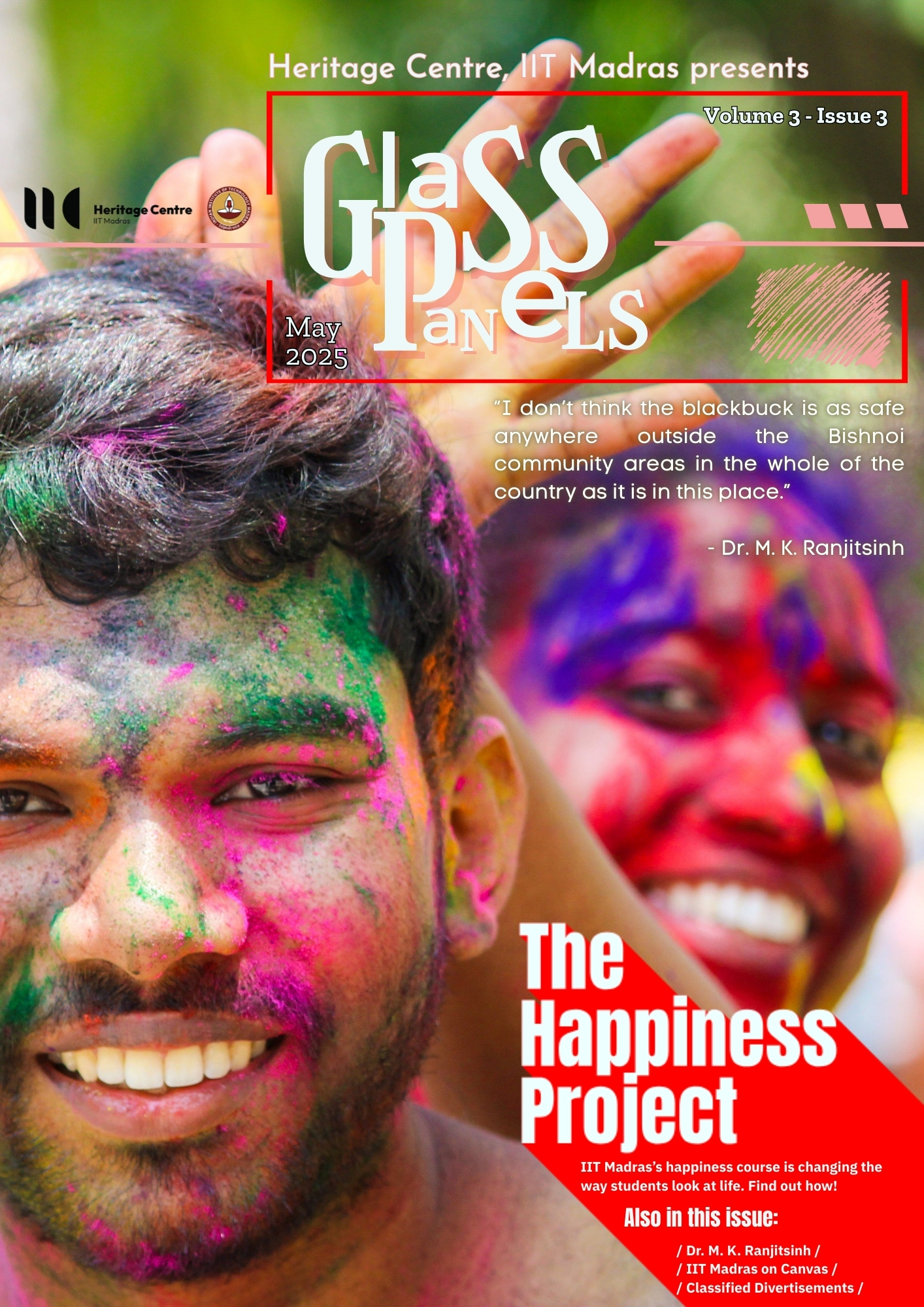
Glass Panels May 2025 - The Happiness Project
Glass Panels – May 2025
This issue of the Heritage Centre magazine explores IIT Madras’s evolving culture and heritage. Highlights include The Happiness Project, a popular course on mindfulness and success; alumnus K. Sashi Rao’s candid account of his traumatic first year in the 1960s; H. K. Panigrahi’s humorous memoir of workshop training; and IIT Madras on Canvas, an art exhibition. It also features poems, divertisements, visitor highlights, and tributes to Prof. S. Santhakumar — blending history, creativity, and community spirit.Meta Description
Glass Panels May 2025: happiness course, alumni memoirs, IITM on Canvas art, divertisements & campus heritage.
Keywords/Tags
IIT Madras, Heritage Centre, Glass Panels magazine, May 2025 issue, Happiness Project, Mindfulness course, Habits Happiness and Success, IITM electives, Alumni memoirs, K. Sashi Rao, Workshop training IITM, IIT Madras on Canvas, Campus art exhibition, Prof. S. Santhakumar tribute, Campus heritage, Institutional history, Alumni stories, Museum musings, Heritage Square quiz, Distinguished visitors, Campus culture IITM
May 15, 2025
-
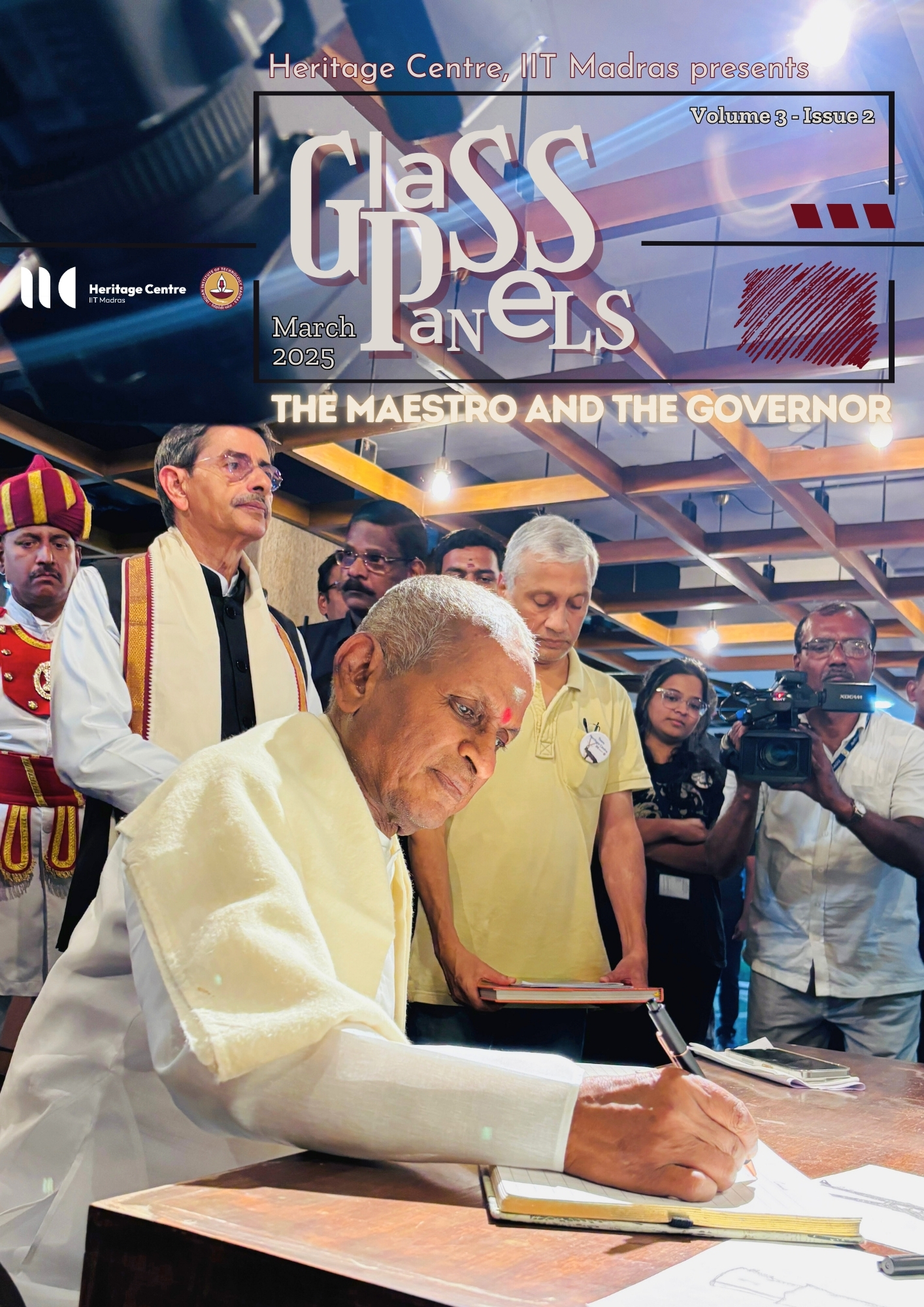
Glass Panels March 2025 - The Maestro and the Governor
Glass Panels – March 2025
This issue of the Heritage Centre magazine captures memorable moments at IIT Madras. Highlights include the visit of Maestro Ilaiyaraaja and Hon’ble Governor R. N. Ravi to the Heritage Centre, a stunning photo essay on butterflies, bees, bugs, and blossoms, and the inspiring story of alumnus R. Kabilan’s tree‑planting initiative in the 1960s. It also features puzzles, cartoons, visitor highlights, campus photography, and news bites — blending heritage, nature, and community spirit.Meta Description
Glass Panels Mar 2025: Ilaiyaraaja & Governor visit, butterfly photo essay, Kabilan’s tree‑planting story & campus heritage.
Keywords/Tags
IIT Madras, Heritage Centre, Glass Panels magazine, March 2025 issue, Ilaiyaraaja, R. N. Ravi, Governor of Tamil Nadu, Maestro visit, Butterfly migration, Bees and blossoms, Campus photography, R. Kabilan, Tree planting IITM, Krishna Hostel, Alumni stories, Campus heritage, Institutional history, Museum musings, Heritage Square quiz, Distinguished visitors, Campus culture IITM
Mar 15, 2025
-
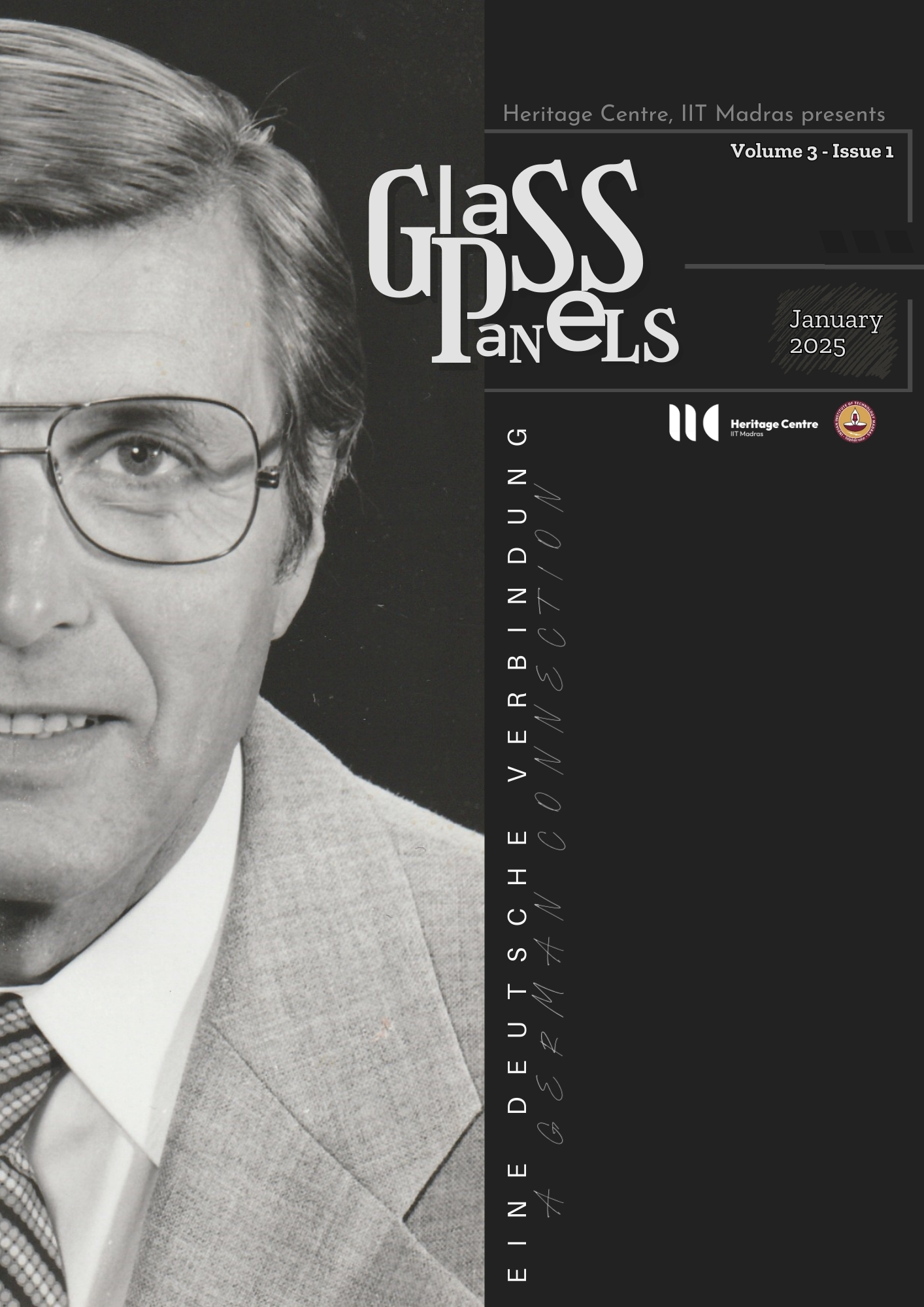
Glass Panels January 2025 - Eine Deutsche Verbindung / A German Connection
Glass Panels – January 2025
This issue of the Heritage Centre magazine opens the new year with stories of IIT Madras heritage and community. Highlights include Prof. Y. Narayana Rao’s anecdotal account of tree planting with German scientist Prof. Dieter Kind, memoirs of ragging in the 1960s, and the quirky tale Dam(n) the River! about water seeping into the Heritage Centre. It also features alumni Diamond Jubilee reunions, cartoons, puzzles, visitor highlights, and reflections on the forest canopy — blending history, humour, and campus culture.Meta Description
Glass Panels Jan 2025: IITM heritage, German connection, ragging memoirs, campus river tale & alumni reunions.
Keywords/Tags
IIT Madras, Heritage Centre, Glass Panels magazine, January 2025 issue, German connection, Prof. Dieter Kind, Tree planting IITM, Ragging memoirs, Dam the River, Diamond Jubilee reunion, Alumni stories, Campus heritage, Institutional history, Museum musings, Heritage Square quiz, Distinguished visitors, Campus culture IITM
Jan 15, 2025
-
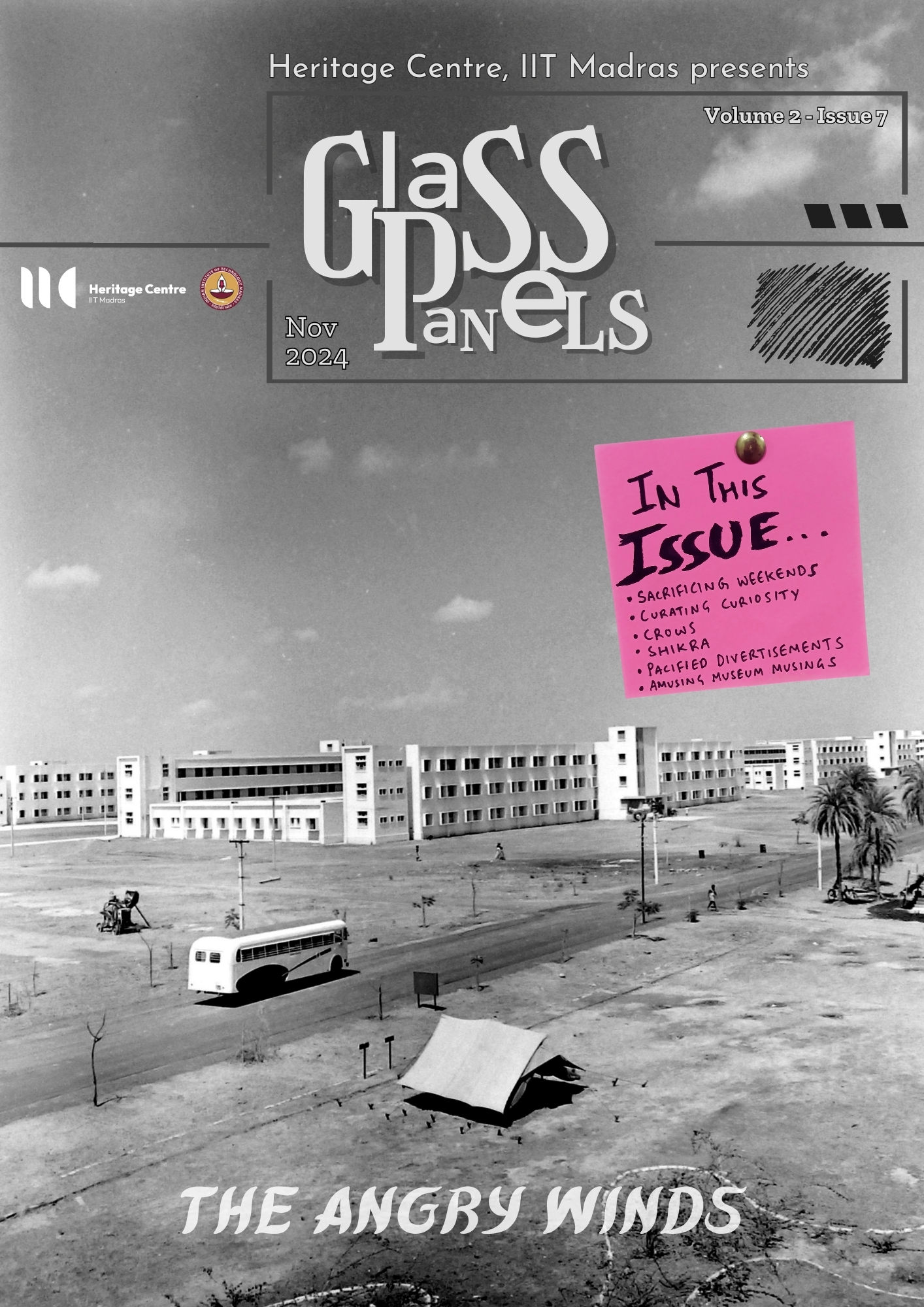
Glass Panels November 2024 - The Angry Winds
Glass Panels – November 2024
This issue of the Heritage Centre magazine features a chilling cover story on the 1966 cyclone in The Angry Winds, reflections on swarms of crows at twilight, and a personal account of sacrificing weekends for IIT Madras’s docent training program. It also includes insights on curating curiosity in museums, a Shikra sighting, cartoons, poems, visitor highlights, and campus art — blending heritage, nature, and creativity at IIT Madras.Meta Description
Glass Panels Nov 2024: cyclone of 1966, crows at twilight, docent training, Shikra sighting & campus heritage.
Keywords/Tags
IIT Madras, Heritage Centre, Glass Panels magazine, November 2024 issue, The Angry Winds, 1966 cyclone, Swarms of crows, Docent training program, Curating curiosity, Shikra sighting, Campus art, Campasart, Alumni stories, Campus heritage, Institutional history, Museum musings, Heritage Square quiz, Distinguished visitors, Campus culture IITM
Nov 15, 2024
-
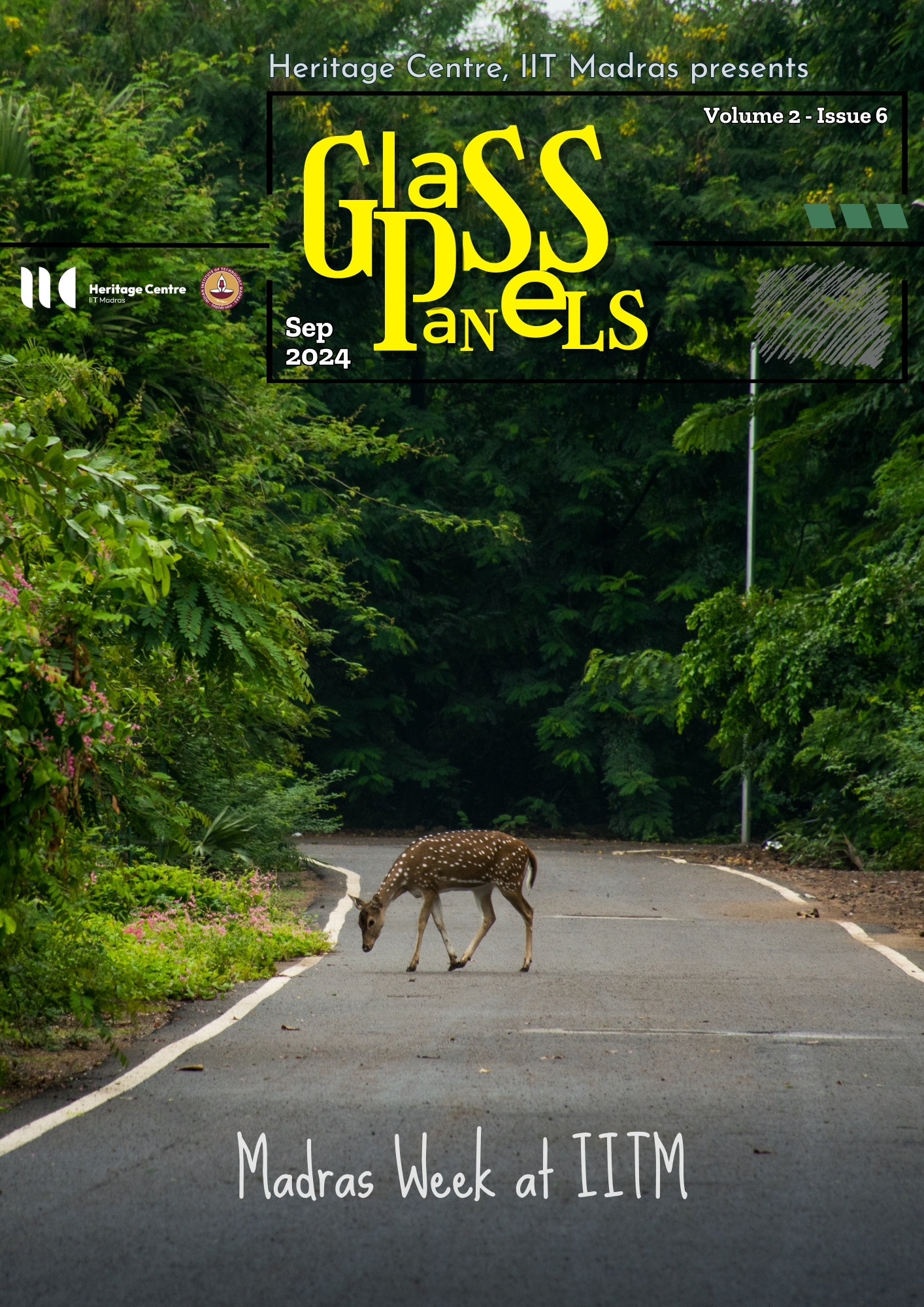
Glass Panels September 2024 - Madras Week at IITM
Glass Panels – September 2024
This issue of the Heritage Centre magazine highlights Madras Week at IIT Madras with a special heritage tour, memoirs of the Central Asian Antiquities Museum, and reflections on IITM’s mural celebrating history and culture. It also features Prof. S. Ramani’s unique story of serving in the Indian Air Force while teaching at IITM, the Heritage Club’s Arikamedu tour, puzzles, cartoons, visitor highlights, and campus news — blending heritage, history, and community spirit.Meta Description
Glass Panels Sep 2024: Madras Week heritage tour, IITM mural, Air Force memoir, Arikamedu trip & campus heritage.
Keywords/Tags
IIT Madras, Heritage Centre, Glass Panels magazine, September 2024 issue, Madras Week, IITM heritage tour, Arikamedu tour, Central Asian Antiquities Museum, IITM mural, Prof. S. Ramani, Indian Air Force memoir, Campus heritage, Institutional history, Alumni stories, Museum musings, Heritage Square quiz, Distinguished visitors, Campus culture IITM
Sep 15, 2024
-
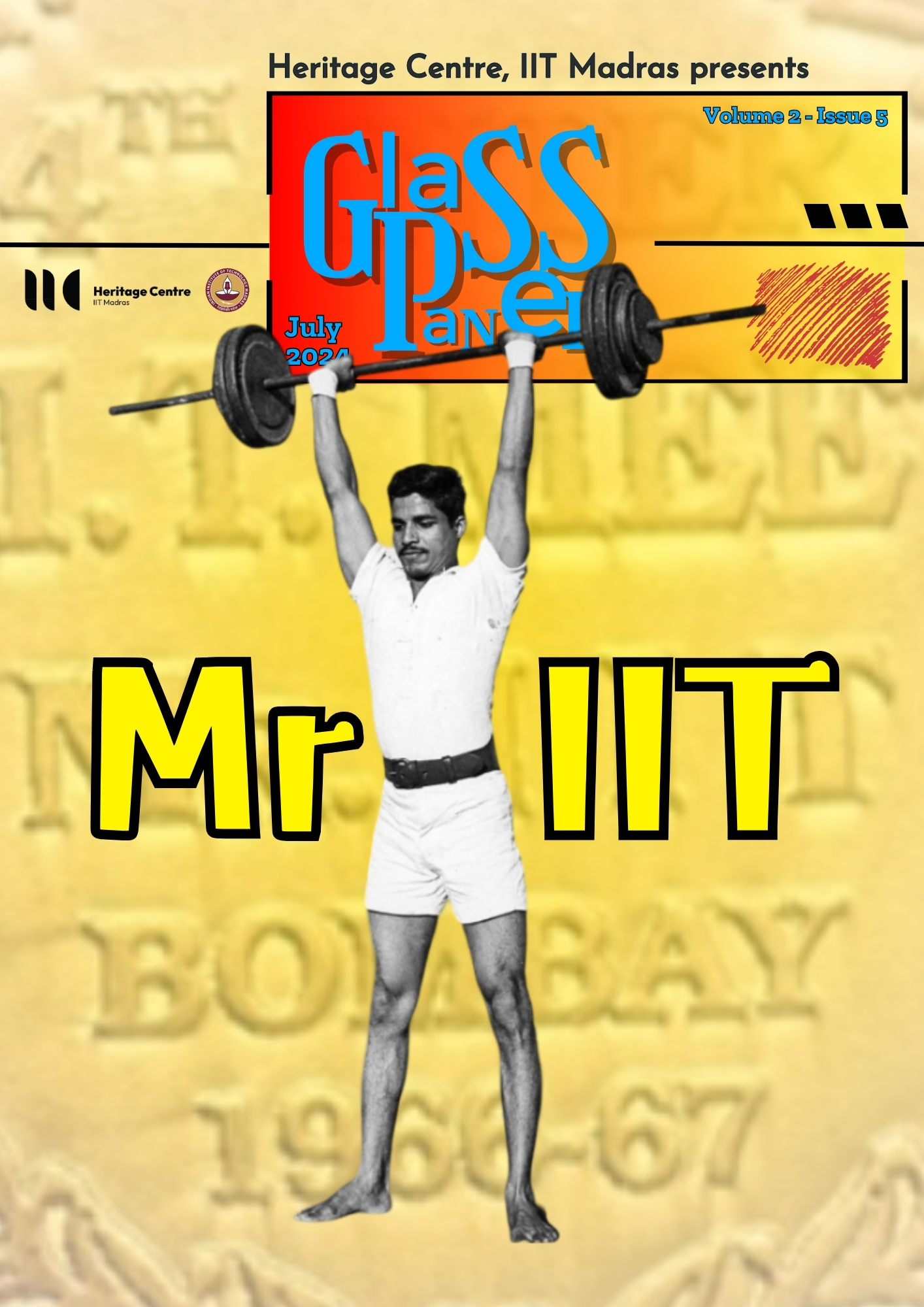
Glass Panels July 2024 - Mr. IIT
Glass Panels – July 2024
This issue of the Heritage Centre magazine features diverse stories from IIT Madras: a rare sighting of Black Kites in “Flycatching,” the history of bodybuilding and sports in “Mr. IIT,” a trek to Tirusulam Hill, and reflections on the Indo‑German scientific bond in “Bose and Einstein.” It also includes puzzles, cartoons, visitor highlights, and new IITM‑themed merchandise — continuing the magazine’s celebration of heritage, culture, and campus life.Meta Description
Glass Panels Jul 2024: Black Kites, Mr. IIT sports history, Tirusulam trek, Bose‑Einstein bond & campus heritage.
Keywords/Tags
IIT Madras, Heritage Centre, Glass Panels magazine, July 2024 issue, Flycatching, Black Kites, Mr. IIT, Bodybuilding history, Sports heritage, Tirusulam trek, Bose and Einstein, Indo‑German collaboration, Campus heritage, Institutional history, Alumni stories, Museum musings, Heritage Square quiz, Distinguished visitors, IITM merchandise, Campus culture IITM
Jul 15, 2024

